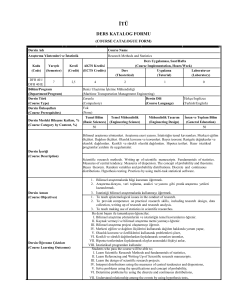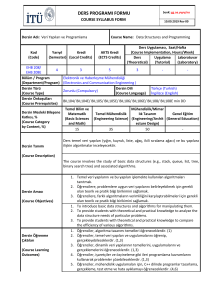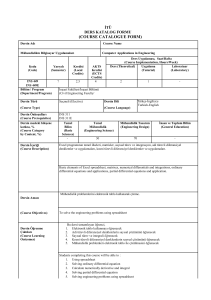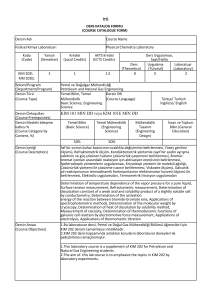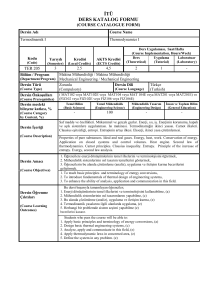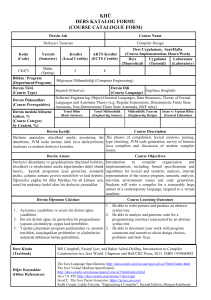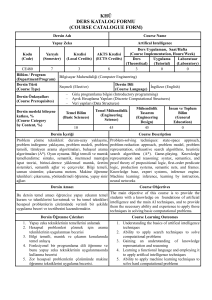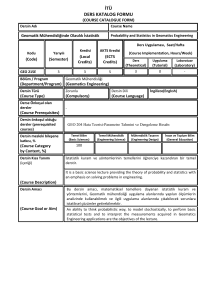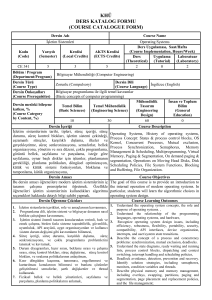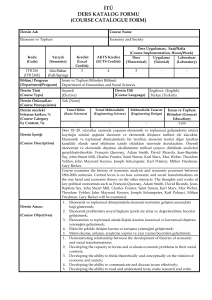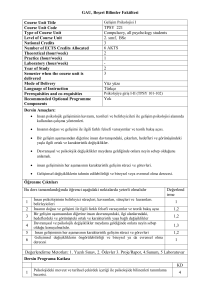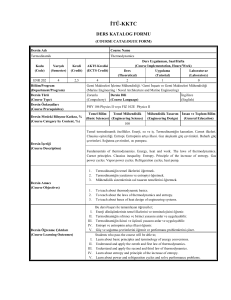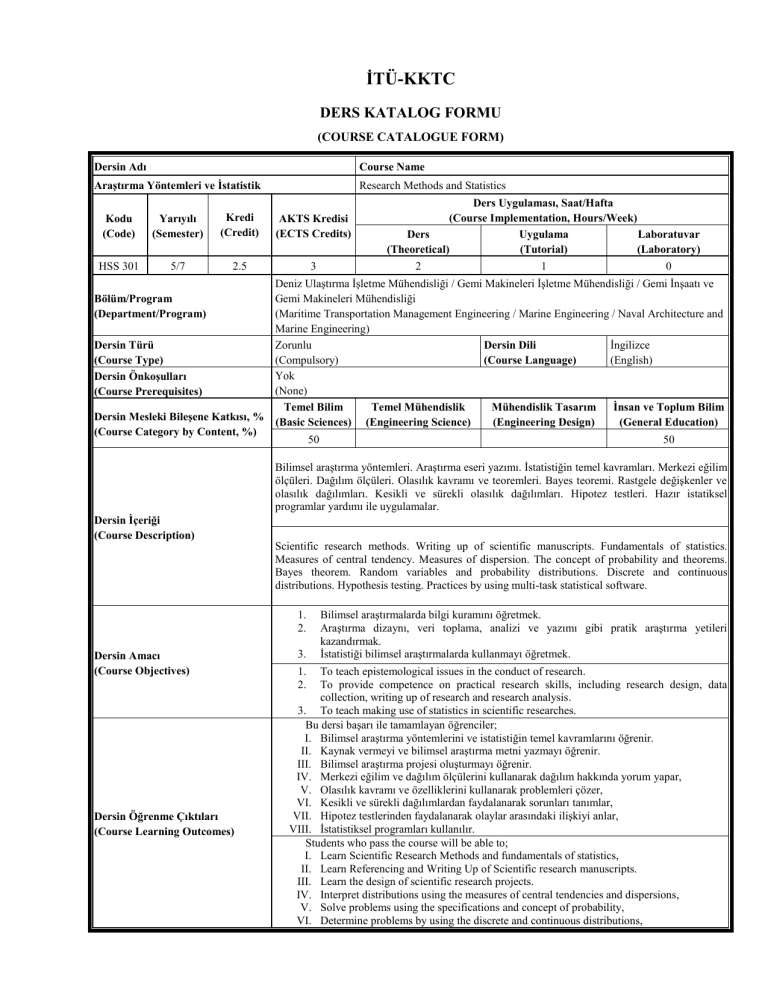
İTÜ-KKTC
DERS KATALOG FORMU
(COURSE CATALOGUE FORM)
Dersin Adı
Course Name
Araştırma Yöntemleri ve İstatistik
Research Methods and Statistics
Kodu
(Code)
Yarıyılı
(Semester)
Kredi
(Credit)
AKTS Kredisi
(ECTS Credits)
HSS 301
5/7
2.5
3
Ders Uygulaması, Saat/Hafta
(Course Implementation, Hours/Week)
Ders
Uygulama
Laboratuvar
(Theoretical)
(Tutorial)
(Laboratory)
2
1
0
Deniz Ulaştırma İşletme Mühendisliği / Gemi Makineleri İşletme Mühendisliği / Gemi İnşaatı ve
Gemi Makineleri Mühendisliği
(Maritime Transportation Management Engineering / Marine Engineering / Naval Architecture and
Marine Engineering)
Zorunlu
İngilizce
Dersin Türü
Dersin Dili
(Compulsory)
(English)
(Course Type)
(Course Language)
Yok
Dersin Önkoşulları
(None)
(Course Prerequisites)
Temel Bilim
Temel Mühendislik
Mühendislik Tasarım
İnsan ve Toplum Bilim
Dersin Mesleki Bileşene Katkısı, % (Basic Sciences) (Engineering Science)
(Engineering Design)
(General Education)
(Course Category by Content, %)
50
50
Bölüm/Program
(Department/Program)
Bilimsel araştırma yöntemleri. Araştırma eseri yazımı. İstatistiğin temel kavramları. Merkezi eğilim
ölçüleri. Dağılım ölçüleri. Olasılık kavramı ve teoremleri. Bayes teoremi. Rastgele değişkenler ve
olasılık dağılımları. Kesikli ve sürekli olasılık dağılımları. Hipotez testleri. Hazır istatiksel
programlar yardımı ile uygulamalar.
Dersin İçeriği
(Course Description)
Scientific research methods. Writing up of scientific manuscripts. Fundamentals of statistics.
Measures of central tendency. Measures of dispersion. The concept of probability and theorems.
Bayes theorem. Random variables and probability distributions. Discrete and continuous
distributions. Hypothesis testing. Practices by using multi-task statistical software.
1.
2.
Dersin Amacı
(Course Objectives)
Dersin Öğrenme Çıktıları
(Course Learning Outcomes)
3.
1.
2.
Bilimsel araştırmalarda bilgi kuramını öğretmek.
Araştırma dizaynı, veri toplama, analizi ve yazımı gibi pratik araştırma yetileri
kazandırmak.
İstatistiği bilimsel araştırmalarda kullanmayı öğretmek.
To teach epistemological issues in the conduct of research.
To provide competence on practical research skills, including research design, data
collection, writing up of research and research analysis.
3. To teach making use of statistics in scientific researches.
Bu dersi başarı ile tamamlayan öğrenciler;
I. Bilimsel araştırma yöntemlerini ve istatistiğin temel kavramlarını öğrenir.
II. Kaynak vermeyi ve bilimsel araştırma metni yazmayı öğrenir.
III. Bilimsel araştırma projesi oluşturmayı öğrenir.
IV. Merkezi eğilim ve dağılım ölçülerini kullanarak dağılım hakkında yorum yapar,
V. Olasılık kavramı ve özelliklerini kullanarak problemleri çözer,
VI. Kesikli ve sürekli dağılımlardan faydalanarak sorunları tanımlar,
VII. Hipotez testlerinden faydalanarak olaylar arasındaki ilişkiyi anlar,
VIII. İstatistiksel programları kullanılır.
Students who pass the course will be able to;
I. Learn Scientific Research Methods and fundamentals of statistics,
II. Learn Referencing and Writing Up of Scientific research manuscripts.
III. Learn the design of scientific research projects.
IV. Interpret distributions using the measures of central tendencies and dispersions,
V. Solve problems using the specifications and concept of probability,
VI. Determine problems by using the discrete and continuous distributions,
VII. Understand relationship among the events by using hypothesis tests,
VIII. Use the statistical softwares.
Ders Kitabı
(Textbook)
Diğer Kaynaklar
(Other References)
Greetham, Bryan, How to Write Better Essays?, Palgrave Macmillan, London, 2nd Ed.,
2008.
Nevin Uzgören, Temel İstatistiksel Yöntemler ve SPSS Uygulamaları, Seçkin, 2012.
Probability and Statistics, Walpole and Myers, Wiley and Sons, Inc. 2004.
1. Denscombe, M, The Good Research Guide for Small Scale Social Research
Projects, Open University Press: Buckingham, 2010.
2. Bailey, Kenneth D., Methods of Social Research, Free Press: NewYork, 2001.
3. İsmail Erdem, Matematiksel İstatistik, Seçkin, 2013.
4. Özer Serper, Uygulamalı İstatistik, Ezgi, Bursa, 2011.
Ödev ve Projeler
(Homework and Projects)
Internet araştırması
Laboratuvar Uygulamaları
(Laboratory Work)
Internet based research
Bilgisayar Kullanımı
(Computer Use)
Bilgisayar laboratuvarında istatiksel program yardımı ile örnek veri analizi yapılması. Bu
konuda iki ödev verilmesi.
Sample data analysis by using statistical software in the computer laboratory. Two
assignments are given as homework.
Diğer Uygulamalar
(Other Activities)
Başarı Değerlendirme Sistemi
(Assessment Criteria)
Faaliyetler
(Activities)
Yıl İçi Sınavları
(Midterm Exams)
Kısa Sınavlar
(Quizzes)
Ödevler
(Homework)
Projeler
(Projects)
Dönem Ödevi/Projesi
(Term Paper/Project)
Laboratuvar Uygulaması
(Laboratory Work)
Diğer Uygulamalar
(Other Activities)
Final Sınavı
(Final Exam)
Adedi
(Quantity)
Değerlendirmedeki Katkısı, %
(Effects on Grading, %)
1
40
2
10
1
50
DERS PLANI
Hafta
Konular
Ders
Çıktıları
1
Giriş: Ne, Niçin ve Nasıl Araştırılır.
I
2
İTÜ Kütüphanesi, Veritabanları, Referanslama ve İntihal Önleme
II
3
Araştırma Sorusunu Belirleme ve Doğru Araştırma Metodolojisini Seçme
I-II-III
4
Anketler: Veri toplama ve Analizi
I-II-III
5
Örneklem Alma ve İçerik Analizi
I-II-III
6
Niceliksel ve Niteliksel Araştırma Metodolojisi
I-II-III
7
Araştırma Bulgularının Metne Dökülmesi
I-II-III
8
İstatistiğin temel kavramları, merkezi eğilim ölçüleri, dağılım ölçüleri
IV
9
Olasılık kavramı, şartlı olasılık ve bağımsız olaylar
V
10
Bayes teoremi, olasılık ve yoğunluk fonksiyonu
11
Binom teoremi, Bernoulli, Poisson, Gamma, Üstel, vb. dağılımlar
VI
12
Değişkenler, Hipotez Testleri, Ki-Kare, t , F testleri
VII
13
Korelasyon, regrasyon analizleri
14
İstatistik program uygulamaları
VII
VIII
V-VI
15
COURSE PLAN
Weeks
Topics
Course
Outcomes
1
Introduction: The what, why and how of research.
I
2
ITU Library and Databases, Referencing and Plagiarism Prevention
II
3
Identifying the Research Question and Choosing an Appropriate Research Methodology
I-II-III
4
Surveys: Data collection and analysis
I-II-III
5
Sampling and Content Analysis
I-II-III
6
Quantitative and Qualitative Research Methodology
I-II-III
7
Writing up Research Findings
I-II-III
8
Fundamentals of statistics Measures of central tendency, dispersion, Curtosis, Skewness
9
Theorems on probability, condition probability and independent events
V
10
Bayes theorem, probability function and the probability density function
V-VI
11
Binomial theorem, Bernoulli and Poisson distributions, Exponential, etc.
VI
12
Random variables, Hypothesis Testing, Chi-square test, t-test, F test
VII
13
Correlation Theory and Regression Analysis
14
Statistical software practices
VII
VIII
15
IV
Dersin Deniz Ulaştırma İşletme Mühendisliği Programıyla İlişkisi
Katkı
Seviyesi
Programın Mezuna Kazandıracağı Bilgi ve Beceriler (Programa İlişkin Çıktılar)
1
a
Matematik, fen ve mühendislik bilgilerini uygulama becerisi
b
Deney tasarlama, deney yapma, veri toplama, sonuçları analiz etme ve yorumlama becerisi
c
Gereksinime yönelik bir sistemi, parçayı veya süreci ekonomik, çevresel, sosyal, politik, etik, sağlık ve
emniyet, üretilebilirlik ve sürdürülebilirlik gibi gerçekçi kısıtlamalar altında tasarlayabilme becerisi
d
Çok disiplinli takım çalışması yürütebilme becerisi
e
Mühendislik problemlerini belirleme, formüle etme ve çözme becerisi
f
Mesleki ve etik sorumluluklara sahip olma bilinci
g
Etkin iletişim kurabilme becerisi
h
Mühendislik çözümlerinin etkilerini küresel, ekonomik, çevresel ve toplumsal çerçevede anlama becerisi
i
Yaşam boyu öğrenme gereksinimini kavrama ve bunu uygulama yeteneği
j
Güncel/çağdaş konulara ilişkin bilgi sahibi olma
k
Mühendislik için gerekli teknikleri ve modern cihazları kullanabilme becerisi
1: Az,
2: Kısmi,
2
3
x
x
x
x
x
x
3: Tam
Relationship between the Course Maritime Transportation Management Engineering Curriculum
Level of
Contribution
Program Outcomes
1
a
An ability to apply knowledge of mathematics, science, and engineering
b
An ability to design and conduct experiments, as well as to analyze and interpret data
c
An ability to design a system, component, or process to meet desired needs within realistic constraints such
as economic, environmental, social, political, ethical, health and safety, manufacturability, and sustainability
d
An ability to function on multidisciplinary teams
e
An ability to identify, formulate, and solve engineering problems
x
x
x
x
f
An understanding of professional and ethical responsibility
g
An ability to communicate effectively
h
The broad education necessary to understand the impact of engineering solutions in a global, economic,
environmental, and societal context
i
A recognition of the need for, and an ability to engage in life-long learning
j
A knowledge of contemporary issues
k
An ability to use the techniques, skills, and modern engineering tools necessary for engineering practice
1: Little,
2: Partial,
Düzenleyen (Prepared by)
2
x
x
3: Full
Tarih (Date)
İmza (Signature)
3

